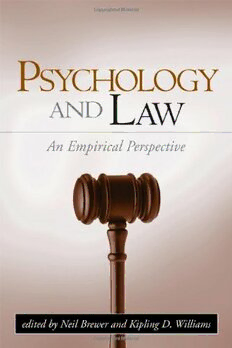
Psychology and Law: An Empirical Perspective PDF
529 Pages·2005·1.837 MB·English
Most books are stored in the elastic cloud where traffic is expensive. For this reason, we have a limit on daily download.
Preview Psychology and Law: An Empirical Perspective
Description:
From the initial investigation of a crime to the sentencing of an offender, many everyday practices within the criminal justice system involve complex psychological processes. This volume analyzes the processes involved in such tasks as interviewing witnesses, detecting deception, and eliciting eyewitness reports and identification from adults and children. Factors that influence decision making by jurors and judges are examined as well. Throughout, findings from experimental research are translated into clear recommendations for improving the quality of evidence and the fairness of investigative and legal proceedings. The book also addresses salient methodological questions and identifies key directions for future investigation.
See more
The list of books you might like
Most books are stored in the elastic cloud where traffic is expensive. For this reason, we have a limit on daily download.
